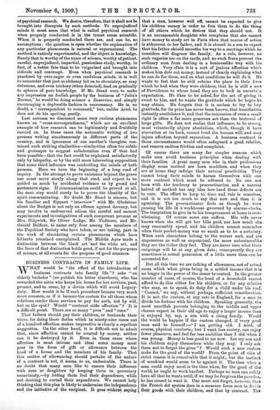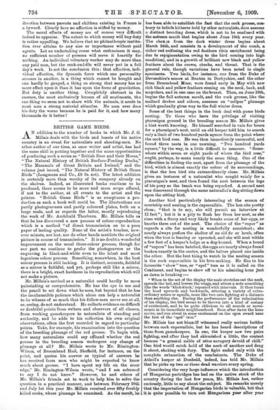BUSINESS CONTRACTS IN FAMILY LIFE.
WHIT would be "the effect of the introduction of business contracts into family life"? asks "an elderly bachelor" (we publish his letter elsewhere), who has rewarded the niece who keeps his house for her services, past, present, and to come, by a device which will avoid Legacy- duty. How would it be if such procedure became very much more common, or if it became the custom for all those whose relations render them services to pay for such, not by will, but on the spot ? Would "contract stifle affection " ? It is a difficult point. There are so many " pros " and "cons."
That fathers should pay their children, or husbands their wives, for doing those duties which in ninety-nine cases out of a hundred affection makes imperative is clearly a repellent suggestion. On the other hand, it is difficult not to admit that, since affection cannot be created by money, neither can it be destroyed by it. Even in those cases where affection is most intense and ideal some money must pass in the form of gift or allowance between the head of a house and the members of his family. That this matter of allowancing should partake of the nature of a contract is not, it seems to us, undesirable. There is no doubt that many men like to ensure their influence with sons or daughters by keeping them in pecuniary uncertainty,—by letting them feel their dependence, while not desiring to curtail their expenditure. We cannot help thinking that this plan is likely to undermine the independence and the initiative of the recipient. It goes without saying that a man, however well off, cannot be expected to give his children money in order to free them to do the thing of all others which he desires that they should not. It is an unreasonable daughter who complains that she cannot have money to study art in Paris when that course of action is abhorrent to her father, and it is absurd in a son to expect that his father should smoothe his way to a marriage which he considers will disgrace the family. As a rule, however, no such vagaries are on the cards, and no such fears prevent the ordinary man from dealing in a businesslike way with his children. Very often it is a sort of jealous affection which makes him dole out money, instead of clearly explaining what he can do for them, and on what conditions he will do it. He wants to feel that he still retains the place in their lives which he had when they were children, that he is still a sort of Providence to whose hand they are to look in uncerta'n expectation. He likes to be asked, for the act of giving is sweet to him, and he wants the gratitude which he hopes he may obtain. He forgets that it is useless to try to buy gratitude, for its price has never been known, that humiliation instantly annihilates it, and that the concession of even a small right is often a far more generous act than the bestowal of large gifts. He does not realise that influence, to be strong, must voluntarily abjure absolutism, which, though it have starvation at its back, cannot bend the human will, and may injure affection beyond reparation. A business contract in these circumstances would often safeguard a good relation, and remove endless friction and complaint.
Of course there are many far simpler reasons which make men avoid business principles when dealing with their families. A great many men who in their professions display some method are born muddlers, and when they are at home they indulge their natural proclivities. They cannot bring their minds to harass themselves with one more contract which must be adhered to. No one nob born with the tendency to procrastination and a natural hatred of method has any idea how hard these defects are to cure. The effort to keep to time and rule is ceaseless, and it is not too much to say that now and then it is agonising. The procrastinator feels as though he were passing his life in a workhouse governed by alarum-clocks. The temptation to give in to his temperament at home is over- whelming. Of course some one suffers. His wife never knows when she will get her bills paid, nor how much she may reasonably spend, and his children cannot remember when their pocket-money was so small as to be a certainty. When such characters belong to the worser sort, and are ungenerous as well as unpunctual, the more unbusinesslike they are the richer they feel. They are never sure what their outgoings will be at any given date ; consequently they are sometimes in actual possession of a little more than can be accounted for.
But all this time we are talking of allowances, not of actual sums which when given bring in a settled income that it is no longer in the power of the donor to control. In the greater number of cases, of course, the head of a household cannot afford to do this either for his children, or for any relative who may, so to speak, do duty for a child under his roof. "Cannot," we say, without perhaps sufficient consideration. It is not the custom, at any rate in England, for a man to divide his fortune with his children. Speaking generally, the most unselfish parents belonging to the middle and upper classes expect in their old age to enjoy a larger income than is enjoyed by, say, a son with a rising family. Would the world be happier if the custom changed, if every good man said to himself:—" I am getting old. I need, of course, physical comforts ; but I want less society, can enjoy fewer pleasures, and feel far less ambition than I did when I was young. Money is less good to me now. Let my son and his children enjoy themselves while they may. I only ask them not to forget the giver " ? Would such a new custom make for the good of the world? From the point of view of strict reason it is conceivable that it might; but the instinct of mankind would seem to be against it. The time when a man could enjoy most is the time when, for the good of the world, he ought to work hardest. Perhaps no man can safely have all that he wants until, if we may be forgiven the paradox, he has ceased to want it. One must not forget, however, that the French dot system does in a measure force men to divi,le their goods with their children, and that by contract. The
devotion between parents and children existing in France is a byword. Clearly here no affection is stifled by money.
The moral effects of money are of course very difficult indeed to appraise. The extent to which money will buy duty is rather appalling. We believe that no philanthropic institu- tion ever attains to any size or importance without paid agents. Let an undertaking rouse what enthusiasm it may, no sufficient number of persons will serve it heartily for nothing. An individual voluntary worker may do more than any paid man, but the rank-and-file will never -put in a full day's work. Is not the conclusion this : that affection, indi- vidual affection, the dynamic force which one personality arouses in another, is a thin which cannot be bought and can hardly be gauged, a thing so strong that money has no more effect upon it than it has upon the force of gravitation. But duty is another thing. Completely abstract in its essence, the most exclusively human of all sentiments, the one thing we seem not to share with the animals, it needs in most men a strong material stimulus. No man ever does his duty the worse because he is paid for it, and how many thousands do it better !































































 Previous page
Previous page